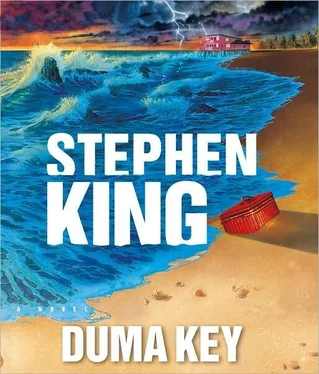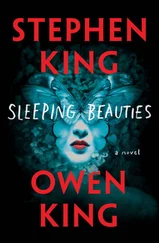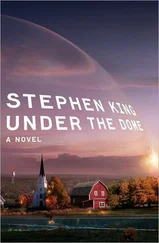“Mary was right. You’re an American primitive. Nothing wrong with that. Grandma Moses was an American primitive. Jackson Pollock was another. The point is, Edgar, you’re talented.”
I opened my mouth. Closed it. I simply couldn’t figure out what to say. Wireman helped me.
“Thank the man, Edgar,” he said.
“Thank you,” I said.
“Very welcome. And if you do decide to show, Edgar, please come to the Scoto first. I’ll make you the best deal of any gallery on Palm Avenue. That’s a promise.”
“Are you kidding? Of course I’ll come here first.”
“And of course I’ll vet the contract,” Wireman said with a choirboy’s smile.
Nannuzzi smiled in return. “You should and I welcome it. Not that you’ll find a lot to vet; the standard Scoto first-artist contract is a page and half long.”
“Mr. Nannuzzi,” I said, “I really don’t know how to thank you.”
“You already did,” he said. “I clutched my heart — what’s left of it — and fell down. Before you go, there’s one more matter.” He found a pad on his desk, scribbled on it, then tore off the sheet and handed it to me like a doctor handing a patient a prescription. The word written on it in large slanting capitals even looked like a word you’d see on a doctor’s prescription: LIQUIN.
“What’s Liquin?” I asked.
“A preservative. I suggest you begin by putting it on finished works with a paper towel. Just a thin coat. Let it dry for twenty-four hours, then put on a second coat. That will keep your sunsets bright and fresh for centuries.” He looked at me so solemnly I felt my stomach rise a little toward my chest. “I don’t know if they’re good enough to deserve such longevity, but maybe they are. Who knows? Maybe they are.”
We ate dinner at Zoria’s, the restaurant Mary Ire had mentioned, and I let Wireman buy me a bourbon before the meal. It was the first truly stiff drink I’d had since the accident, and it hit me in a funny way. Everything seemed to grow sharper until the world was drenched with light and color. The angles of things — doors, windows, even the cocked elbows of the passing waiters — seemed sharp enough to cut the air open and allow some darker, thicker atmosphere to come flowing out like syrup. The swordfish I ordered was delicious, the green beans snapped between my teeth, and the crème brûlée was almost too rich to finish (but too rich to leave). The conversation among the three of us was cheerful; there was plenty of laughter. Still, I wanted the meal to be over. My head still ached, although the throb had slid to the back of my skull (like a weight in one of those barroom bowling games), and the bumper-to-bumper traffic we could see on Main Street was distracting. Every horn-honk sounded ill-tempered and menacing. I wanted Duma. I wanted the blackness of the Gulf and the quiet conversation of the shells below me as I lay in my bed with Reba on the other pillow.
And by the time the waiter came to ask if we wanted more coffee, Jack was carrying the conversation almost single-handed. In my state of hyper-awareness I could see that I wasn’t the only one who needed a change of venue. Given the low lighting in the restaurant and Wireman’s mahogany tan, it was hard to tell just how much color he’d lost, but I thought quite a bit. Also, that left eye of his was weeping again.
“Just the check,” Wireman said, and then managed a smile. “Sorry to cut the celebration short, but I want to get back to my lady. If that’s okay with you guys.”
“Fine by me,” Jack said. “A free meal and home in time to watch SportsCenter ? Such a deal.”
Wireman and I waited outside the parking garage while Jack went to get the rented van. Here the light was brighter, but what it showed didn’t make me feel better about my new friend; in the glow spilling out of the garage, his complexion looked almost yellow. I asked him if he was okay.
“Wireman’s as fine as paint,” he said. “Miss Eastlake, on the other hand, has put in a few restless, shitty nights. Calling for her sisters, calling for her Pa, calling for everything but her pipe and bowl and fiddlers three. There’s something to that full-moon shit. It makes no logical sense, but there it is. Diana calls on a wavelength to which only the tottering mind is attuned. Now that it’s in its last quarter, she’ll start sleeping through again. Which means I can start sleeping through again. I hope.”
“Good.”
“If I were you, Edgar, I’d sleep on this gallery thing, and for more than one night. Also, keep painting. You’ve been a busy bee, but I doubt if you have enough pictures yet to—”
There was a tiled pillar behind him. He staggered back against it. If it hadn’t been there, I’m pretty sure he would have gone down. The effects of the bourbon were wearing off a little, but there was enough of that hyper-reality left for me to see what happened to his eyes when he lost his equilibrium. The right one looked down, as if to check out his shoes, while the bloodshot and weepy left one rolled up in its socket until the iris was no more than an arc. I had time to think that what I was seeing was surely impossible, eyes couldn’t go in two completely different directions like that. And that was probably true for people who were healthy. Then Wireman started to slide.
I grabbed him. “Wireman? Wireman! ”
He gave his head a shake, then looked at me. Eyes front and all accounted for. The left one was glistening and bloodshot, that was all. He took out his hankie and wiped his cheek. He laughed. “I’ve heard of putting other people to sleep with a boring line of quack, but oneself? That’s ridiculous.”
“You weren’t dozing off. You were… I don’t know what you were.”
“Don’t be seely, dollink,” Wireman said.
“No, your eyes got all funny.”
“That’s called going to sleep, muchacho .” He gave me one of his patented Wireman looks: head cocked, eyebrows raised, corners of the mouth dimpled in the beginnings of a smile. But I thought he knew exactly what I was talking about.
“I have to see a doctor, have a checkup,” I said. “Do the MRI thing. I promised my friend Kamen. How about I make it a twofer?”
Wireman was still leaning against the pillar. Now he straightened up. “Hey, here’s Jack with the van. That was quick. Step lively, Edgar — last bus to Duma Key, leaving now.”
It happened again, on the way back, and worse, although Jack didn’t see it — he was busy piloting the van along Casey Key Road — and I’m pretty sure Wireman himself never knew. I had asked Jack if he minded skipping the Tamiami Trail, which is west coast Florida’s engagingly tacky Main Street, in favor of the narrower, twistier way. I wanted to watch the moon on the water, I said.
“Gettin those little artist eccentricities, muchacho, ” Wireman said from the back seat, where he was stretched out with his feet up. He wasn’t much of a stickler when it came to seatbelts, it seemed. “Next thing we know, you’ll be wearing a beret.” He pronounced it so it rhymed with garret .
“Fuck you, Wireman,” I said.
“I been fucked to the east and I been fucked to the west,” Wireman recited in tones of sentimental recollection, “but when it comes to the fuckin, yo mamma’s the best.” With that he lapsed into silence.
I watched the moon go swimming through the black water to my right. It was hypnotic. I wondered if it would be possible to paint it the way it looked from the van: a moon in motion, a silver bullet just beneath the water.
I was thinking these thoughts (and maybe drifting toward a doze) when I became aware of ghostly movement above the moon in the water. It was Wireman’s reflection. For a moment I had the crazy idea that he was jerking off back there, because his thighs appeared to be opening and closing and his hips seemed to be moving up and down. I shot a peek at Jack, but the Casey Key Road is a symphony of curves and Jack was absorbed in his driving. Besides, most of Wireman was right behind Jack’s seat, not even visible in the rearview mirror.
Читать дальше










